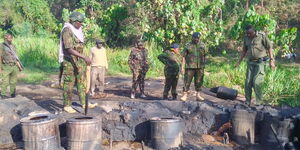The National Police Service (NPS) launched a new system to be employed when handling Gender-Based Violence (GBV) victims.
Dubbed the 'Shadow Pandemic' government data shows that 45% of women and girls aged 15 to 49 have experienced physical violence and 14% have experienced sexual violence.
The new protocol was conceptualised by Superintendent of Police Zipporah Nderitu.
After serving for 22 years, officer Nderitu was fed up with how GBV victims were handled, pushing her to formulate the new directive.
“The victim is tossed from one office to another; go to hospital, get yourself checked, come back give me the statement, get me the witness. So the victim gets to talk to about five to seven police officers, talking about it (sexual assault) over and over again. We are re-victimising them,” she explained.
Under the new protocol, a new police-friendly and people-centred approach to addressing GBV named Policare is to be implemented across the country.
Under Nderitu's plan, the NPS will now offer a one-stop GBV centre where victims will now access all services within the same premises.
To avoid the torturous ordeal of having to relive the heinous crime during multiple interviews, the NPS has designated an old building in the Old Nairobi Area, to serve as a dedicated centre for such crimes.
It is currently under renovation and the National Gender and Equality Commission (NGEC) has given the government 90 days from August 18, to operationalise it.
There will be limited contact between the police and the victim, at such centres.
“At the Policare, once evidence is taken, the victim takes a bath and changes clothes, picks his or her dignity and goes back home with his or her self-dignity intact. A magistrate will also be on site and cases will be heard immediately,” Officer Nderitu revealed to the media.
In the past, GBV victims have often been scared to come forward to file their cases in fear of the extra trauma that arises when they have to narrate their experience at least thrice.
Nderitu's system will be digitised to mitigate the above. Information will be fed into the data bank by the victim. An officer on duty will then retrieve the data with the victim exempted from explaining the crime all over again.
Policare will also have a special unit to deal with sexual assault against persons with intellectual disability.
Officer Nderitu has been pushing for Policare's approval for over 5 years following sustained opposition.
However, she stuck to her guns and in August 2019, Deputy Inspector General Edward Mbugua finally gave her the go ahead.
GBV is one of the most prevalent human rights violations. It involves a wide variety of agents from intimate partners and family members, to strangers and institutional actors such as teachers, pastors, office managers and police.
A government study found out the commonest forms of GBV mentioned by men and women included inflicting bodily harm, physical assault, verbal abuse and rape.
The Covid-19 crisis has magnified the structural violence and inequalities that the most vulnerable in the society including women, youth and children and Persons living with Disability (PWD) continue to endure.












